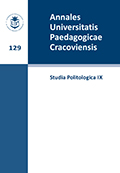„Polityczne resztówki”? Biografie jako czynnik kształtowania stanowiska katolickich środowisk opiniotwórczych wobec Niemiec
Abstract
Searching for the means of contacting Germany by the independent circles in the reality of the People’s Poland was a sign of far-sightedness motivated by, among others, the Christian social thought. Loopholes as well as internal changes of the power and control apparatus were used to broaden contacts and get involved as many people as possible. The genesis of such attitudes can be found in much earlier times: the pre-war enlivenment of the Christian laity, personalistic thought and the innovative ideas of rebirth in the spirit of the Second Vatican Council as well as personal experiences of the Polish witnesses of the 20th century. That vector of the ideas and values met in the post-war reality with the vector of the reason of the state that was only partially realized in the official political practice. It was not in the country’s business to feed the enmity with the western neighbour but rather to search for solutions that would guarantee a peaceful coexistence allowing to think about the future Polish-German co-operation. The opposition, contrarily to the authorities of the People’s Republic of Poland, judged the case of Germany from the perspective of the principle of selfdetermination. It meant realizing the postulate of Poland’s sovereignty and the reunification of Germany, treated by the independent circles and the emigration not as a threat but as a chance for creating order in Europe in accordance with the aspirations of the nations as well breaking with the regulations imposed by the Yalta Conference. Polish liberation endeavours were in the Germany’s business, paving the way to its reunification. Without the organization of work on the change of the mutual perception of the nations, without going beyond the consequences of the historical dramas and cumulative biases, it would not be possible to accept the changes that came true after 1989.Downloads
Published
2015-08-07
Issue
Section
Scientific paper
License
Redakcja przyjmuje do druku teksty oryginalne, wcześniej niepublikowane. Treść czasopisma jest dostępna na licencji Creative Commons (CC-BY-NC-ND 3.0 PL)
Licencja ta zezwala na wykorzystanie materiałów opublikowanych w czasopiśmie w celach niekomercyjnych np. komentarza, krytyki, informacji, archiwizacji, nauczania lub prowadzenia badań, z poszanowaniem aktualnie obowiązującego prawa autorskiego (ustawa z dnia 4 lutego 1994 r. o prawie autorskim i prawach pokrewnych Dz.U. 1994 nr 24 poz. 83 z poźn. zm.). Zgodnie z wymogami licencji, konieczne jest dokładne podanie źródła cytowania lub parafrazowania oraz zachowanie tekstu w oryginalnej postaci (zakaz tworzenia utworów zależnych).

